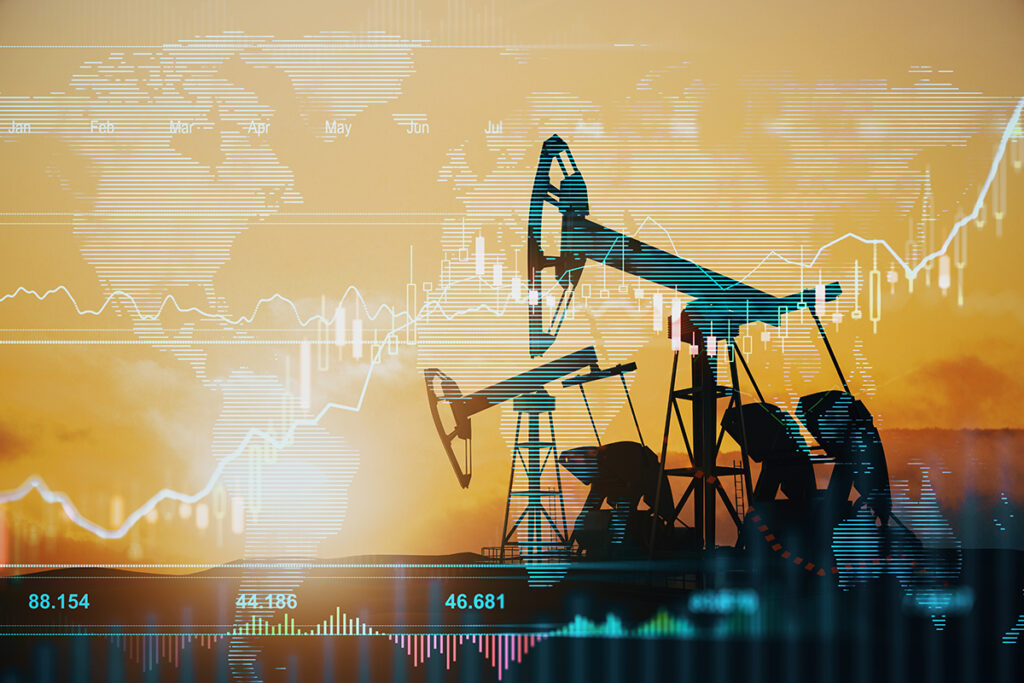Markets react sharply to escalating Middle East conflict, with fears of wider disruption in global energy supplies.
Oil prices surged on Friday in one of the biggest intraday jumps in years, as investors reacted to Israel’s military strike on Iran, raising concerns over a potential regional war and major energy supply disruptions.
Brent crude, the global oil benchmark, climbed nearly 6% to almost $71 per barrel, while US crude oil spiked 8.6% to $74 per barrel. Earlier in the day, prices had soared as much as 13%, marking the steepest single-day rally since March 2022, shortly after Russia’s invasion of Ukraine.
The sharp increase in prices reflects not only immediate concerns over supply but also heightened fears of prolonged instability in the Middle East. “Negative headlines could extend the timeline for escalation unlike the prior Israel-Iran episode,” wrote Ahmad Assiri, research strategist at Pepperstone.
Global Markets React: Stocks Fall, Safe Havens Rise
The geopolitical shock reverberated across global financial markets. Investors pulled back from risk assets and flocked to traditional safe havens. Gold rose 1.7% to $3,444 per troy ounce, while the US dollar strengthened.
Wall Street closed sharply lower. The Dow Jones Industrial Average plunged 665 points (1.55%), the S&P 500 dropped 1%, and the Nasdaq Composite fell 1.15%.
Shares in airline and travel companies tumbled amid concerns over regional instability. United Airlines lost 4.4%, Delta fell 4%, and American Airlines dropped 4.8%. European carriers like EasyJet, IAG (British Airways), and Lufthansa also declined more than 3.5%.
Cruise and travel companies followed suit: Expedia lost 2.8%, Royal Caribbean dropped 3.1%, Norwegian fell 4.3%, and Carnival plunged 5.4%.
In contrast, defense contractors rose. Lockheed Martin climbed 2.7%, and General Dynamics gained 1.4%.
Israel Launches Assault, Iran Vows Retaliation
Early Friday, Israel launched an unprecedented military operation against Iranian nuclear and missile facilities, reportedly killing two top Iranian commanders. Israeli Prime Minister Benjamin Netanyahu confirmed the strikes in a televised address, saying the operation would continue “for as many days as it takes to remove this threat.”
A state of emergency was declared in Israel as officials braced for an Iranian counterattack. Supreme Leader Ayatollah Ali Khamenei vowed “severe punishment,” signaling the likelihood of a significant retaliation.
Meanwhile, US Secretary of State Marco Rubio stated that the United States was not involved in the Israeli operation and warned Iran not to target American interests or personnel.
Energy Markets on Edge: Strait of Hormuz in Focus
The energy market’s response has been driven by concerns that Iranian retaliation could target critical infrastructure or disrupt oil transport through the Strait of Hormuz, a chokepoint that handles about a fifth of global oil supply.
If Iranian oil is removed from global markets, prices could rise another $7.50 per barrel, said Andy Lipow, president of Lipow Oil Associates. But the bigger fear is a broader escalation that affects other oil producers or transport routes.
“Should oil exports through the Strait of Hormuz be affected, we could see $100 oil,” Lipow warned.
In response to the price spike, OPEC pushed back against the idea of releasing emergency oil reserves. The group’s secretary general said on X that “there are currently no developments in supply or market dynamics that warrant unnecessary measures.”
Bob McNally, president of Rapidan Energy Group, told CNN this position is consistent with OPEC’s strategy to “lay low and hope this blows over.”
Still, the situation could have ripple effects. Analysts at Capital Economics noted that higher oil prices could reignite global inflation, making central banks—like the US Federal Reserve—more cautious about cutting interest rates. Fed officials are scheduled to meet next week.
Rising Risk Premium and Potential Contagion
McNally added that the market had been “complacent about the risk of geopolitical disruptions,” and that with Israel now attacking Iran, a significant “risk premium” is likely to be priced into oil going forward.
Priyanka Sachdeva, senior analyst at Phillip Nova, said Iran’s preparations for military retaliation heighten the chance of wider disruptions and even “contagion” affecting other oil-producing countries in the region.
She also warned that while President Trump has shown reluctance to intervene directly, any US involvement could dramatically escalate concerns for global markets.


